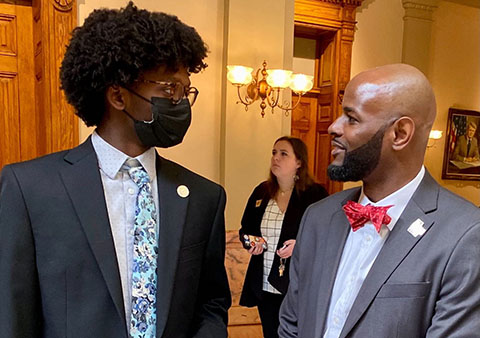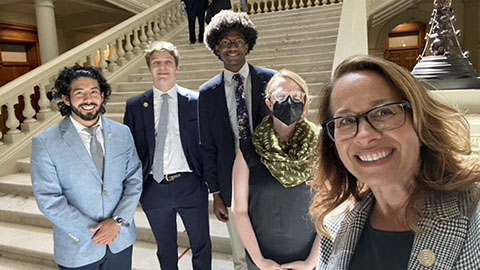Oxford students visit prison, present to state legislature on college courses for incarcerated people

Oxford students Dyson Stallworth and Niels Armbruster were part of a team led by English professor Sarah Higinbotham that brought a policy brief on college courses in prisons to the Georgia State Legislature.
Dr. Sarah Higinbotham knows her students can memorize facts, concepts, and statistics, but she also knows they learn better when they engage with the complexities of the real world. This was the case when Higinbotham, Assistant Professor of English, took a group of Oxford students to a graduation at Burruss State Prison, where for 15 years she has taught humanities courses to incarcerated students with her nonprofit Common Good Atlanta. Oxford students took what they were learning beyond the classroom, across campuses and prisons, and—eventually—into the Georgia State Legislature.
A few months after that prison visit with the experience fresh in mind, two of her students, Dyson Stallworth and Niels Armbruster—along with then-Emory PhD candidate Sadie Warren and students from Morehouse and Kennesaw State—researched, wrote, and presented a policy brief on the floor of the Georgia State Legislature on the positive effects of college courses in prisons. The group was supported by senator Nan Orrock. A third Oxford student, Aditi Mishra, contributed to the policy brief but has been studying at Bard College this semester and was not able to attend the presentation.
First, the group presented to the Committee of Higher Education in February; they were then invited back in March to speak to the Public Safety Committee. After both sessions, Higinbotham recalled how, as a result of each presentation, legislators flocked to the students for more information. Since then, Higinbotham has been asked to write a resolution commending the work Common Good has done with the prison system in Georgia.
Stallworth, a first-year Oxford student, came to the project when he and Higinbotham discussed his interest in pursuing a law degree—a goal that stems from his desire to help the communities closest to him and members of his family who have dealt with the prison system.
Originally from Orlando, Stallworth, who is passionate about criminal justice reform, focused on a few key points when approached after the presentation, especially that the recidivism rate—the likelihood an incarcerated person ends up back in prison once out—was less than one percent for those who completed their courses. He also talked about his experience visiting the prison.

Oxford student Dyson Stallworth discussing the impact of college courses in prison in the halls of the Georgia State Legislature.
“You really can’t experience that from text on paper,” he said. “So, I shared with them how life-changing it was. You can tell the students are absorbing what they’re learning and putting it to use even within the prison. Some of them had children, and they talked about how they were on the phone helping their kids out with homework—being someone their children can be proud of even in the system. I communicated that with the senators.”
Armbruster, another first-year Oxford student, plans to major in math and economics. In Higinbotham’s writing seminar, he was also fascinated by the statistics on recidivism. After writing a paper on the topic, Higinbotham put him in touch with Patrick Rodriguez, director of advocacy and community engagement at Common Good, and a formerly incarcerated alum of the program—now a Kennesaw State student who led the group’s presentation on the senate floor. The two had an instant rapport, and Armbruster joined the project.
“I think the small class sizes and the culture of the professors having a connection with the students allowed me to get this opportunity,” he said. “At first it might seem unrelated to what I’m studying—economics are connected, math not as much. But one thing about this experience is that it changed how I look at what I can do later in life.”
Higinbotham spoke about the impact of both visiting the prison and presenting to the state legislature:
“When students have to think about their work intellectually—in this case reading social critiques of mass incarceration and reform movements in justice—while seeing what it actually looks like in practice, they understand the rest of their time in college that what they’re learning has the transformative power to fix problems,” she said. “The fact that there is crossover between Oxford students and incarcerated students, Oxford students and state senators, demonstrates the power of proximity.”
“I just see the way it changes both groups of people,” she said of when her Oxford students interact with her incarcerated students. “They just become one group of people, just people... They see that they are intellectual peers. They laugh at the same jokes. The same things make them angry. They interpret literature in similar ways.”

Left to right: Patrick Rodriguez, Kennesaw State; Niels Armbruster; Dyson Stallworth; Sadie Warren; Sarah </p><p> Higinbotham
It was also important that Oxford students had the opportunity to work with an Emory PhD candidate, Sadie Warren, who successfully defended her philosophy dissertation in April and whose work was funded through the Mellon Foundation’s Public Writing Fellowship.
After visiting the prison and presenting on the floor of the state senate, Armbruster felt he had a broader perspective, as well as a renewed passion for his own studies.
“Heeding the advice of the incarcerated students, I’m trying to be deliberate in the way I do my work, because if all of those scholars were no longer in prison, I know they would be,” he said. “We had one-on-one conversations with a lot of them, just discussing what we take for granted in everyday life. It was really cool and a very humbling opportunity.”
Stallworth was grateful to find himself doing such involved and meaningful work his first year on campus:
“I envisioned myself playing the background in my first year, being in the books and studying my classes,” he said. “Dr. Higinbotham is one of those professors that really wants to see me do something with my life. She sees something in me. She’s pouring in her resources and connections and making sure I make use of my time here at Oxford. I looked around my community growing up and saw there was a lack of opportunity. Being an intern with Dr. Higinbotham and Common Good, I saw the opportunities I can present when I go back home. My plan is to make the impact I wanted to see growing up.”